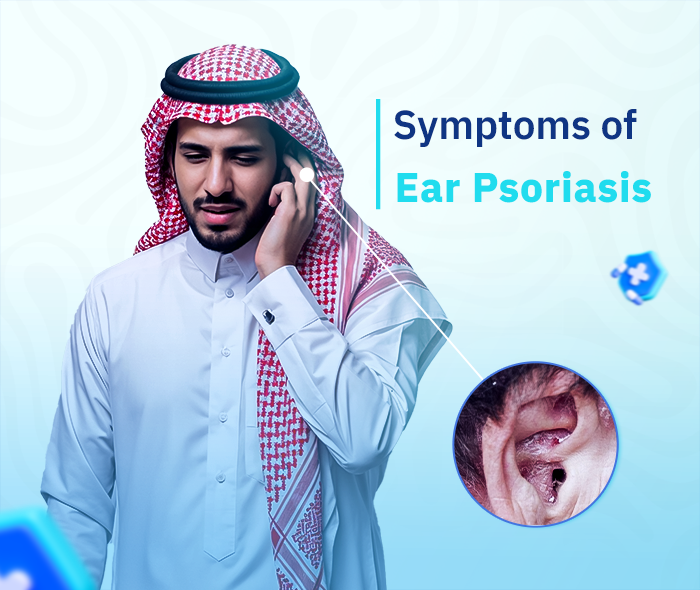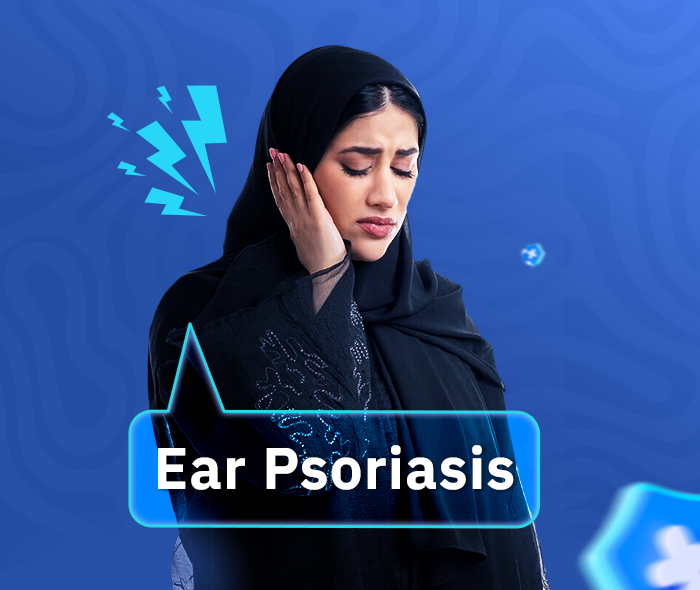ear psoriasis
Did you know that psoriasis can also affect the ear and is called ear psoriasis? While this his skin condition is commonly known for affecting areas like the knees and elbows, it can also appear in the ear, causing itching, flaking, and sometimes hearing problems. The impact of psoriasis on the ear can be annoying and uncomfortable, affecting the quality of daily life. In this article, you will discover what ear psoriasis is, how to treat it, and how to prevent it.
- What is ear psoriasis
- Types of psoriasis that affect the ear
- Causes of ear psoriasis
- Symptoms of ear psoriasis
- Common areas of psoriatic dermatitis in the ear
- Diagnosis of ear psoriasis
- Treatment of ear psoriasis
- Preventive measures for ear psoriasis
What is ear psoriasis?
Ear psoriasis is a chronic skin condition that occurs due to an overreaction of the immune system, which tries to protect the body from germs and other invaders. This leads to the accumulation of dead skin cells in the ear area, causing thick, scaly patches to form. The symptoms typically appear on the outer part of the ear and sometimes in the fold behind the ear, it can also occur inside the ear canal, but it does not affect more sensitive areas like the eardrum.
Types of psoriasis that affect the ear
There are several types of ear psoriasis that may directly affect its health, although they share similar symptoms. Among the most common types that affect the ear are:
Plaque psoriasis:
This type of psoriasis causes thick, scaly patches of skin to form inside or on the ear, leading to swelling and redness in the affected area.
Inverse psoriasis:
This type causes soft plaques in the folds of the ear, and the symptoms are often less severe compared to other types.
Seborrheic psoriasis:
This type results in yellow, scaly, greasy spots on the skin of the ear, combining both psoriasis and seborrheic dermatitis.
Causes of ear psoriasis
The exact cause of psoriasis remains undefined, but several factors may contribute to the development of this condition, including:
- Genetic factors: A family history is considered one of the influencing factors in the development of psoriasis,if there are family members with psoriasis, an individual is more likely to develop it.
- Immune system disorders: Psoriasis occurs due to a malfunction in the immune system, where the body starts attacking its healthy cells abnormally, leading to an improper immune response.
- Environmental factors: Certain environmental factors may exacerbate the condition, such as exposure to cold and dry weather, psychological stress, or infections that may trigger the onset of symptoms.
- Smoking and alcohol: Studies indicate that smoking and alcohol consumption can worsen psoriasis.

Symptoms of ear psoriasis
The symptoms of ear psoriasis vary from person to person and may include a range of the following signs:
- The appearance of thick scales on the outer ear or inside the ear canal.
- Itching or a burning sensation in the ear area.
- Dry skin.
- Pain or inflammation.
- Hearing loss due to partial or complete blockage of the ear caused by the scales
Common areas of psoriatic dermatitis in the ear
Psoriatic dermatitis can appear on the skin in any part of the ear, including the ear canal.
Psoriasis behind the ear:
Some experts consider symptoms of psoriasis on the skin behind the ear as a type of scalp psoriasis, this condition is characterized by scaly plaques and is caused by an overactive immune response, there are several other factors that may contribute to developing psoriasis behind the ear, such as:
- Depression
- Obesity
- The presence of other autoimmune diseases
- Not taking prescribed medications regularly
Psoriasis of the ear canal:
If you have psoriasis in the inner ear or ear canal, it’s important to treat it promptly, although the symptoms are similar to those found in other parts of the ear, the accumulation of plaques can lead to blockage, resulting in temporary hearing problems.
Diagnosis of ear psoriasis
The diagnosis of ear psoriasis is made by a dermatologist or healthcare provider, who will begin by examining the skin and reviewing your full medical history, since psoriasis can be hereditary, the doctor is likely to ask about a family history of skin conditions. A physical examination is usually sufficient to make an accurate diagnosis, but since the symptoms may resemble other skin conditions, additional tests, such as a skin biopsy, may be conducted to confirm the diagnosis or rule out other diseases.
If psoriasis is affecting hearing, you may need to consult an ear, nose, and throat (ENT) specialist.

Treatment of ear psoriasis
Since the skin of the ear is thinner and more sensitive than the rest of the body, treating ear psoriasis requires special treatment and care.
Biologic treatments:
In severe cases of psoriasis, the doctor may recommend biologic medications, which are more effective in controlling the immune system’s response.
Moisturizing treatments:
Moisturizers can be used to hydrate the ear and alleviate dryness and itching.
Warm water baths:
A warm water bath can help alleviate dryness and reduce scaling, but it is important to avoid very hot water, as it may cause irritation.
Preventive measures for ear psoriasis
In addition to following a treatment plan, you can adopt some healthy habits to prevent the symptoms from worsening, including:
- Gently wash the outer part of your ears every day.
- Avoid cleaning the ear with cotton swabs, as they may push dead skin and natural earwax deeper into the ear canal.
- Use a mild moisturizer to keep the ear skin from becoming dry.
- Avoid triggers that can worsen symptoms, such as stress or excessive sun exposure.
Ear psoriasis is a chronic skin condition that can significantly impact the lives of those affected by it, although it cannot be completely cured, there are many ways to manage and alleviate its symptoms, early diagnosis and appropriate treatment are essential, along with adopting a healthy lifestyle to reduce the negative effects of the disease.

